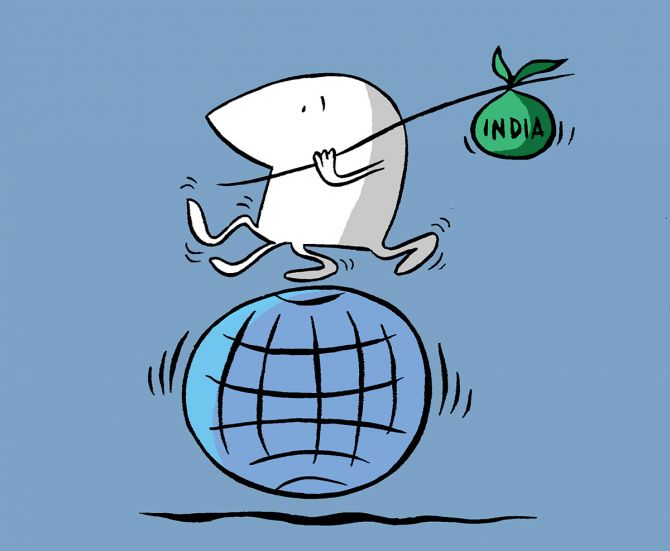'Investors should look to incrementally allocate towards equity from a medium-to-long term horizon.'

The coming year or two are packed with a lot of global and macro events which will inject some bit of intermittent volatility, but these shouldn't be a concern for long-term investors, Mrinal Singh, CEO and chief investment officer, InCred Asset Management, tells Abhishek Kumar/Business Standard.
After the fourth quarter results, which segments of the market seem primed to outperform?
The earnings season has been a mixed bag.
While technology companies have disappointed vis-à-vis expectations, sectors like manufacturing, healthcare, cement, and two-wheeler auto space have fared better in terms of volumes growth.
There are green shoots of recovery in rural demand, which is likely to benefit rural heavy consumer staples and two-wheelers for instance.
Further, the input cost moderation bodes well for manufacturing companies.
Financial stocks have seen a strong run-up in the last two years or so. Do you see the trend continuing?
The run-up in financials has been driven by improving asset quality, strong credit growth, and -- in the case of PSUs -- the ability to rapidly transmit interest rate changes.
However, businesses may have to over-deliver to be able to continue giving these kind of returns.
While investing, sector should not be a key criteria and stock selection should depend on the merits of the business.
What are your earnings growth expectations for the 2023-2024 financial year (FY24)?
Will it provide enough impetus for the market to go up significantly?
Earnings are expected to see mid-teens growth during the FY24-FY26 period.
The overall inflation is moderating, which bodes well for the cost element across sectors and businesses. They should have a positive rub-off on the earnings trajectory during upcoming quarters.
We are particularly bullish on healthcare, manufacturing, and rural focused companies, which may see better demand during the festival season particularly if monsoon stays normal.
What strategy should retail investors adopt?
We are seeing signs of improvement across macro indicators like moderation in inflation and interest rates expected to have peaked.
This is a very healthy and fertile market for long-term investors, especially as the valuations have returned to normal levels.
Investors should look to incrementally allocate towards equity from a medium-to-long term horizon.
India's volatility index dipped to multi-year low recently. Is it a sign of an ensuing bull market?
It is important to understand that equity markets are cyclical in nature and at any given point in time, are influenced by a host of elements.
So, we should avoid a constrained approach to assessing opportunities in the stock market and investors wanting to stay the course shall not only focus on the most recent factors, but the long-term paybacks of it.
Any global triggers that can substantially change the course of the Indian market?
The near-term phase is packed with a lot of global and macro events which will inject some bit of intermittent volatility.
We are entering a phase where in the next 24 months, we are going to see elections in a host of major global economies -- including India and the US.
Moreover, the geopolitical situation is affecting the global economy in a multitude of ways.
The war in Europe (Russia-Ukraine) has a direct impact on commodity prices, including oil and gas and other rare metals that originate from that part of the world.
It is indirectly impacting interest rates, which is, in a way, making investments costlier. Interest rate cuts to revive growth will be the next potential trigger for global economies.
Rising interest rates had kept the equity markets muted last year, but the cycle has peaked as we see domestic inflation easing out.
Commodity prices are now returning to normal levels as supply chain issues are getting resolved.
This will help improve profitability for Indian corporates which have been severely impacted due to inflationary pressures on the raw material side.
However, none of these factors should concern longer-term investors.
Feature Presentation: Ashish Narsale/Rediff.com












 © 2025
© 2025